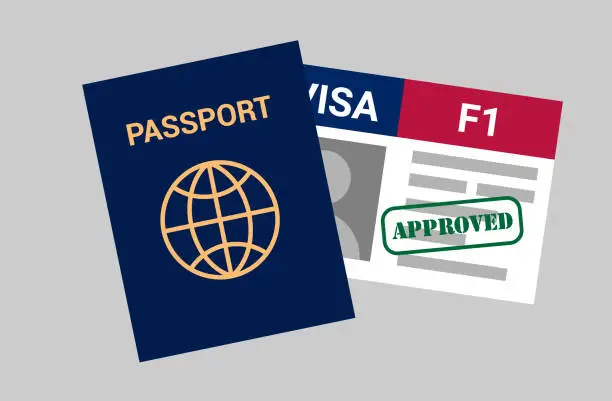Student Visa vs. Tourist Visa: Key Differences You Must Know

When planning to travel abroad, it’s crucial to understand the difference between a student visa and a tourist visa. While both allow international travel, their purposes, eligibility requirements, and permissions vary significantly. Using the wrong visa type can lead to visa rejection, deportation, or even legal consequences.
In this guide, we’ll break down the key differences between a student visa and a tourist visa, helping you make the right choice based on your travel purpose.
1. What is a Student Visa?
A student visa is a type of visa that allows individuals to study in a foreign country for a specific duration. It is granted to students enrolled in full-time academic programs, vocational courses, or exchange programs at recognized educational institutions.
📌 Key Features of a Student Visa:
✅ Allows full-time study at a recognized institution.
✅ May permit part-time work during studies (varies by country).
✅ Typically valid for the duration of the course + some extra months.
✅ Requires proof of financial support and admission from a university.
🎓 Example of Student Visas:
- USA: F-1 Visa
- Canada: Study Permit
- UK: Student Visa (Tier 4)
- Australia: Subclass 500
- Germany: National Student Visa
2. What is a Tourist Visa?
A tourist visa is issued for short-term travel related to leisure, vacation, family visits, or business meetings. It does not permit long-term study or employment.
📌 Key Features of a Tourist Visa:
✅ Allows travel for tourism, sightseeing, or visiting family/friends.
✅ Usually valid for a few weeks to a few months.
✅ Does not allow studying full-time or working.
✅ Requires proof of financial ability and travel itinerary.
🌍 Example of Tourist Visas:
- USA: B-2 Visa
- Schengen Visa: For European countries
- UK: Standard Visitor Visa
- Canada: Temporary Resident Visa (TRV)
- Australia: Subclass 600
3. Key Differences Between Student Visa and Tourist Visa
| Feature | Student Visa | Tourist Visa |
|---|---|---|
| Purpose | Education (full-time study) | Travel, tourism, short visits |
| Duration | Course duration + extra time | Short-term (a few weeks to months) |
| Work Rights | Limited work rights (depends on country) | No work allowed |
| Eligibility | Admission to a recognized institution required | No admission required |
| Financial Proof | Must show proof of tuition and living expenses | Must show enough funds for travel expenses |
| Extending Stay | Can be extended for further studies | Usually non-extendable |
| Conversion to Work Visa | Possible in some countries | Not possible |
4. Can You Study on a Tourist Visa?
No, you cannot enroll in full-time academic programs on a tourist visa. However, some countries allow short-term courses under a tourist visa:
📌 Allowed:
✅ Language courses (less than 3 months in some countries).
✅ Short-term training programs.
🚫 Not Allowed:
❌ Full-time degree programs.
❌ Long-term courses (exceeding tourist visa validity).
💡 Example:
- USA: A tourist visa (B-2) does not allow studying; you need an F-1 visa.
- UK: A visitor visa allows short courses (up to 6 months), but for degree programs, you need a Student Visa.
5. Can You Convert a Tourist Visa to a Student Visa?
In most countries, you cannot switch from a tourist visa to a student visa while inside the country. You usually need to leave the country and apply for a student visa from your home country.
📌 Exceptions: Some countries may allow conversion under special conditions, but this is rare. Always check the official immigration website of your destination country.
6. Which Visa Should You Apply For?
✅ Apply for a Student Visa if:
✔️ You have been accepted into a university or college.
✔️ Your course duration is more than a few months.
✔️ You plan to work part-time while studying (if permitted).
✅ Apply for a Tourist Visa if:
✔️ You only plan to visit a country for leisure or sightseeing.
✔️ You are attending a short-term course (if allowed).
✔️ You are visiting family or attending a business meeting.
7. Common Mistakes to Avoid When Applying for a Visa
🚫 Applying for a tourist visa instead of a student visa – This can result in rejection or future visa bans.
🚫 Giving incorrect information – Always provide accurate details in your application.
🚫 Not meeting financial requirements – Ensure you have enough funds to cover your stay.
🚫 Not checking visa policies – Rules vary by country, so read official guidelines before applying.
Conclusion
A student visa and a tourist visa serve very different purposes. If you plan to study abroad for more than a few months, always apply for a student visa. If you just want to visit a country for travel, sightseeing, or family visits, a tourist visa is the right choice.
Applying for the correct visa type will help you avoid legal issues and ensure a smooth travel experience. Always check your destination country’s official immigration website for the latest rules and requirements.
Frequently Asked Questions (FAQs)
1. Can I work on a tourist visa?
No, a tourist visa does not permit work. Working illegally can result in fines, deportation, or a visa ban.
2. How long can I stay in a country on a tourist visa?
It depends on the country. Tourist visas are usually valid for 30 to 180 days.
3. What happens if I overstay my tourist visa?
Overstaying a visa can lead to penalties, fines, deportation, or bans on future visas.
4. Can I apply for a student visa while on a tourist visa?
In most cases, no. You must return to your home country and apply for a student visa.
5. Do all countries require a visa for students and tourists?
No, some countries allow visa-free travel for short stays. Always check the visa requirements for your nationality.


Leave a Reply